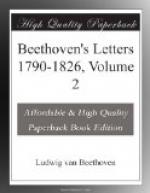Your generous conduct can never be forgotten by me, and I hope shortly to convey my thanks to Sir Smart in particular, and to Herr Stumpff. I beg you will deliver the metronomed 9th Symphony to the Society. I enclose the proper markings.
Your friend, with high esteem,
BEETHOVEN.
[Footnote 1: A hundred pounds had been sent at once.]
[Footnote 2: In the original the words placed within brackets are dictated by Beethoven himself, and were indeed the last he ever dictated—but they are crossed out.]
476.
CODICIL.[1]
Vienna, March 23, 1827.
I appoint my nephew Carl my sole heir. The capital of my bequest, however, to devolve on his natural or testamentary heirs.
LUDWIG VAN BEETHOVEN.[2]
[Footnote 1: See No. 463. Schindler relates:—“This testament contained no restrictions or precautionary measures with regard to his heir-at-law, who, after the legal forms connected with the inheritance were terminated, was entitled to take immediate possession of the whole. The guardian and curator, however, knowing the unexampled levity of the heir, had a valid pretext for raising objections to these testamentary depositions. They therefore suggested to the maestro, to alter his intentions in so far as to place his property in trust; his nephew to draw the revenue, and at his death the capital to pass to his direct heirs. Beethoven, however, considered such restraints as too severe on the nephew whom he still so dearly loved in his heart [since December of the previous year the young man had been a cadet in a royal regiment at Iglau, in Moravia], so he remonstrated against this advice; indeed he reproached Hofrath Breuning as the person who had suggested such harsh measures. A note, still extant, written by Breuning to Beethoven, shows the state of matters, in which he still maintains, though in moderate language, the absolute necessity of the above precautions. This mode of argument seemed to make an impression on the maestro, who at last promised to yield his own wishes. By his desire, Breuning laid the codicil of three lines before him, and Beethoven at once proceeded to copy it, which was no easy matter for him. When it was finished he exclaimed, ‘There! now I write no more!’ He was not a little surprised to see on the paper the words ‘heirs of his body’ changed into ‘natural heirs.’ Breuning represented to him the disputes to which this destination might give rise. Beethoven replied that the one term was as good as the other, and that it should remain just as it was. This was his last contradiction.”]
[Footnote 2: Next day, at noon, he lost consciousness, and a frightful death-struggle began, which continued till the evening of March 26, 1827, when, during a violent spring storm of thunder and lightning, the sublime maestro paid his last tribute to that humanity for which he had made so many sacrifices in this world, to enter into life everlasting, which, from his life and actions, few could look forward to more hopefully.]




